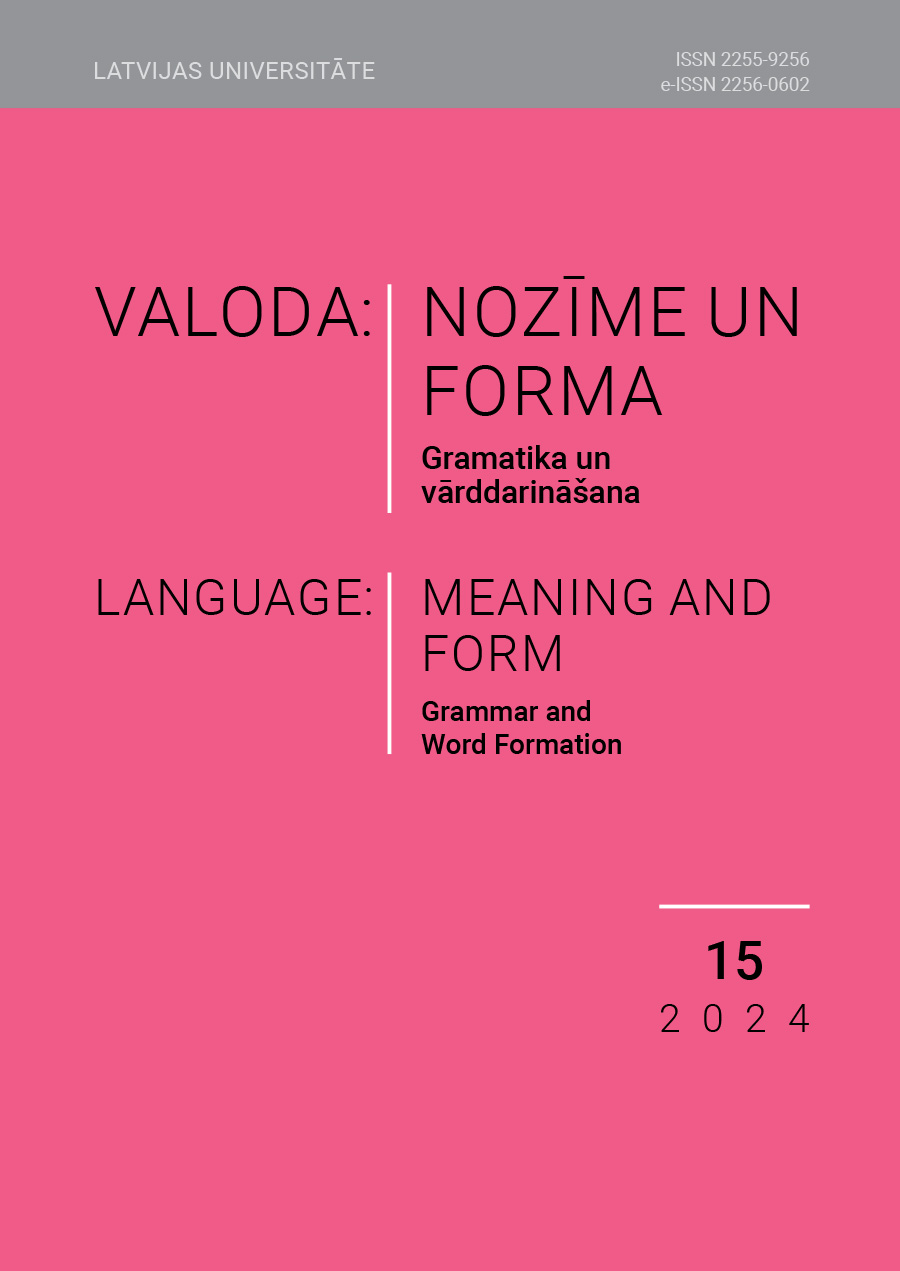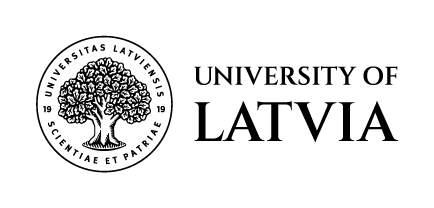Term formation in the Hippocratic Corpus: Osteology and angiology
DOI:
https://doi.org/10.22364/vnf.15.04Keywords:
term formation, term, multi-word term, compound word terms, Hippocratic Corpus, osteology, angiologyAbstract
The article is dedicated to observations regarding term formations in The Hippocratic Corpus treatise “Nature on Bones”. The research material is analysed in its original text in Ancient Greek. The article encompasses an introduction, empirical part, and a conclusion. The introduction informs on the readers of The Hippocratic Corpus, its origin, possible time of writing of the treatise, authorship, content, and the present-day research of this source. The empirical part elaborates on the classification of term formation and analysis of terms, elucidating the transfer of common language words to a specific medical field, parts of speech used in terms and the structures underlying parts of speech, as well as methods of word formation. There are terms, multi-word terms and compound-word terms observed in the treatise. In the article, terms are analysed in the following groups: 1) nouns, 2) nouns with non-agreement attributes, 3) nouns with agreement attributes, 4) nouns with adverbs, and 5) compounds. The first group includes words of common language which have been under influence of the process of terminologization. This group is the largest regarding the number of terms and use, but these terms are employed only for reference to basic anatomy. The second, third, and forth groups cover multi-word terms. These three groups are not as large as the first one, but the terms here are highly specialized, allowing the naming of concepts in angiology. The last group is compound-word terms. It is the smallest group but similarly to the multi-word terms these are more specialized and can also be attributed to a conceptualized terminology.
References
Crane, Gregory R. (ed.). 2024. Hippocrates, De ossium natura. Chapter 1–19. Pieejams: https://scaife.perseus.org/reader/urn:cts:greekLit:tlg0627.tlg048.1st1K-grc1:1-5/
Fībiga, Ieva. 2023. Hipokratiskais korpuss. Nacionālā enciklopēdija. Pieejams: https://enciklopedija.lv/skirklis/131041-hipokratiskais-korpuss
Halm, Karl. (ed.). 1868. Quintilian. Institutio Oratoria. Lipsiae: Teubner. Pieejams: https://penelope.uchicago.edu/thayer/e/roman/texts/quintilian/institutio_oratoria/home.html
Kassel, Rudolf. (ed.). 1966. Aristotle's Ars Poetica. Oxford: Clarendon Press. Pieejams: http://www.perseus.tufts.edu/hopper/text?doc=Perseus:text:1999.01.0055
Kukjalko, Brigita. 2023. Joniešu dialekts. Nacionālā enciklopēdija. Pieejams: https://enciklopedija.lv/skirklis/96577-jonie %C5 %A1u-dialekts
Ķemere, Ināra, Lāms, Ojārs (red.). 2008. Aristotelis. Poētika. Rīga: Jāņa Rozes apgāds.
Potter, Paul (ed.). 2010. Hippocrates. IX. Cambridge, Massachusetts, London, England: Harvard University Press.
Rudzītis, Kristaps. 2005. Terminologia medica. Rīga: Nacionālais apgāds.
Skujiņa, Valentīna (red.). 2007. Valodniecības pamatterminu skaidrojošā vārdnīca. Rīga: Latvijas Universitātes Latviešu valodas institūts. Pieejams: https://termini.gov.lv/
Thesaurus Linguae Graecae: A Digital Library of Greek Literature. 2001. Irvine, California: TLG. Pieejams: https://stephanus.tlg.uci.edu/
Craik, Elizabeth M. 2017. The 'Hippocratic' Corpus: Content and Context. London, New York: Routledge, Taylor & Francis Group. https://doi.org/10.4324/9781315736723 DOI: https://doi.org/10.4324/9781315736723
Fībiga, Ieva. 2015. Medicīnas valoda Senajā Grieķijā un tās attīstība. Linguistica Lettica. 23, 182–202. Pieejams: https://lavi.lu.lv/wp-content/uploads/2021/03/Linguistica_Lettica_23.pdf
Fībiga, Ieva. 2021. Metaforisku terminu attīstība sengrieķu medicīnas tekstos. Promocijas darbs. Rīga: Latvijas Universitāte. Pieejams: https://luis.lu.lv/pls/pub/luj.fprnt?l=1&fn=F-1635557211/Fibiga_Ieva_if07001.pdf
Gaile, Agnese, Hofa, Aija van. 2003. Hipokratiskie raksti. Izlase. Rīga: Liepnieks un Rītups.
Kalnača, Andra, Lokmane, Ilze. 2021. Latvian Grammar. Riga: University of Latvia Press. https://doi.org/10.22364/latgram.2021 DOI: https://doi.org/10.22364/latgram.2021
Knowles, Murray, Moon, Rosamund. 2006. Introducing Metaphor. London, New York: Routledge. Taylor and Francis Group. https://doi.org/10.4324/9780203642368 DOI: https://doi.org/10.4324/9780203642368
Lakoff, George, Johnson, Mark. 2003. Metaphors We Live by. Chicago, London: University of Chicago Press. DOI: https://doi.org/10.7208/chicago/9780226470993.001.0001
Lipourlis, Dimitrios. 2007. Medical vocabulary. A History of Ancient Greek from Beginnings to Late Antiquity. Christidis, Anastasios-Fivos (ed.). Cambridge: Cambridge University Press, 1104–1115.
Skujiņa, Valentīna. 2002. Latviešu terminoloģijas izstrādes principi. Rīga: Latviešu valodas institūts.
Wickkiser, Bronwen, L. 2008. Asklepios, Medicine, and the Politics of Healing in Fifth-Century Greece. Baltimore, Maryland: The Johns Hopkins University Press. DOI: https://doi.org/10.56021/9780801895067
Downloads
Published
Issue
Section
License

This work is licensed under a Creative Commons Attribution-NoDerivatives 4.0 International License.


